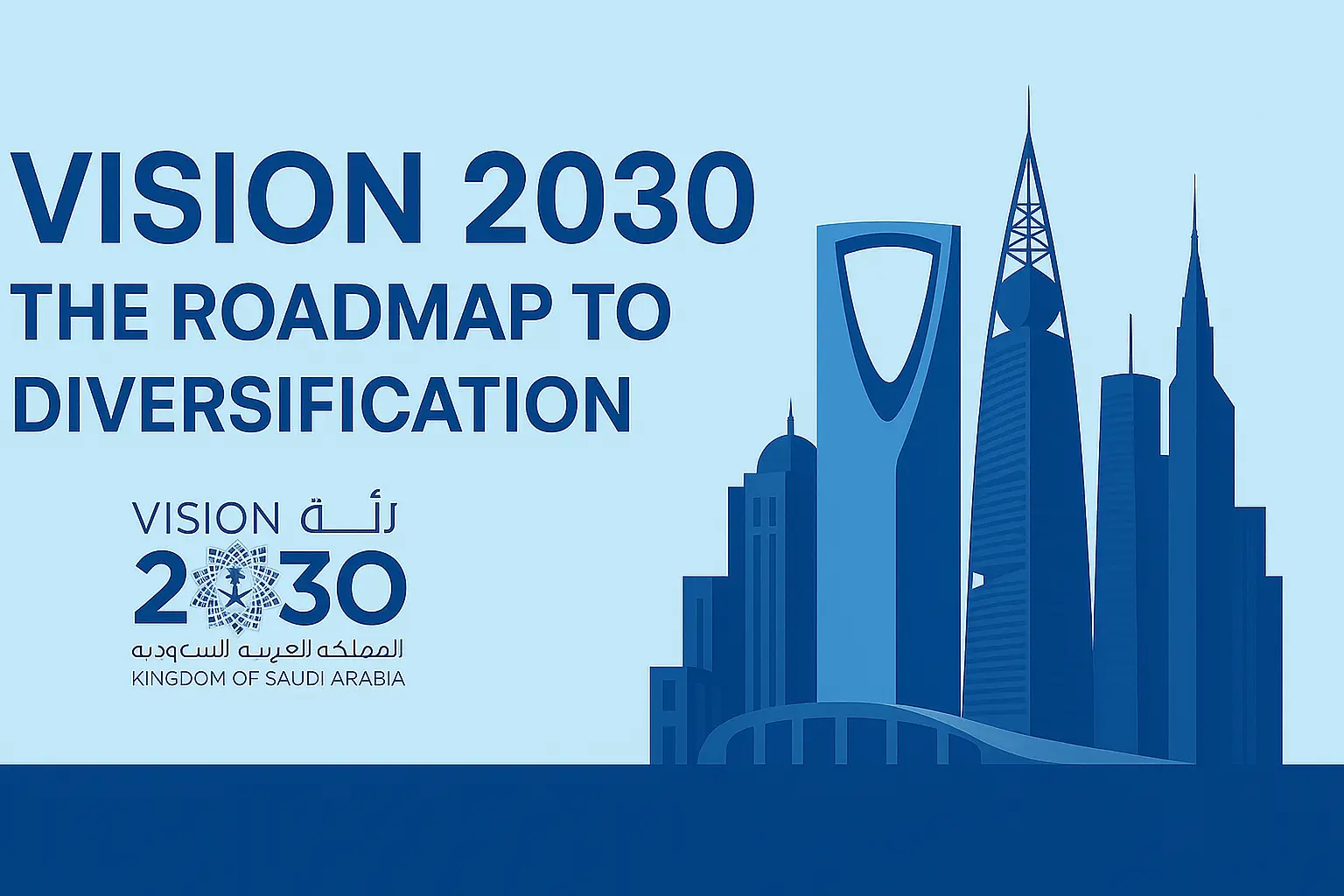Vision 2030 and the Rise of Data-Driven Decision Making in Saudi Arabia
In recent years, Saudi Arabia has embarked on a monumental journey through its Vision 2030. This ambitious plan aims to transform its economy, reduce reliance on oil, and introduce innovative technologies across all sectors. While much attention has been given to the energy, tourism, and cultural aspects of the Vision, one key element that stands at the core of the transformation is data-driven decision making. This shift is not just a technological upgrade; it represents a fundamental shift in how policies are crafted, how businesses operate, and how governments serve their citizens.
The rapid advancements in artificial intelligence (AI), big data, and advanced analytics have made data-driven decision-making more attainable than ever before. Saudi Arabia is strategically positioning itself as a global leader in this area, ensuring that every decision, whether made by public officials or business leaders, is informed by real-time data, predictions, and actionable insights.
This article delves into the role of data-driven decision making in realizing the ambitious goals of Vision 2030, examining its impact on government policy, economic diversification, business operations, and citizen engagement.
The Role of Data in Vision 2030
The ultimate objective of Saudi Vision 2030 is to diversify the economy and create a vibrant society where every sector thrives. Central to achieving this goal is the strategic use of data to guide decision-making. The Saudi government has realized that in order to implement Vision 2030 successfully, it must become a “data-first” nation—leveraging data at every level of governance, business, and daily life.
Data-driven decision making allows for more precise policy formulation, improved efficiency, and better resource management. Whether it’s crafting economic policies, managing energy consumption, or addressing societal challenges, data is becoming the cornerstone of how decisions are made. Vision 2030 explicitly states that data will be a driving force in meeting the country’s future objectives.
Leveraging Data for Economic Planning
Saudi Arabia’s National Industrial Development and Logistics Program (NIDLP) is one of the flagship initiatives under Vision 2030 that aims to transform the Kingdom into a global industrial hub. Data plays a vital role in economic diversification, especially in optimizing resource allocation, monitoring industry performance, and ensuring sustainability.
By using real-time economic data, businesses and government agencies can make informed decisions on how to allocate resources, identify emerging industries, and forecast future trends. For example, AI-based predictive models can forecast the demand for goods and services, helping to avoid overproduction or shortages.
Improving Government Operations through Data
The Saudi government is using data-driven decision-making to improve efficiency and service delivery. For instance, in sectors such as healthcare and education, data analytics allows for better planning, resource management, and public welfare improvement. By using data visualization tools and predictive models, government officials can make timely decisions on pressing issues such as public health and urban planning.
Moreover, data-driven governance is helping improve transparency, reduce inefficiencies, and increase accountability in government operations. These improvements directly align with the goals of Vision 2030 to modernize the public sector and enhance the overall quality of services provided to citizens.
2. The Impact of Artificial Intelligence and Big Data
At the heart of data-driven decision making are AI and big data technologies. These technologies enable Saudi Arabia to process vast amounts of data and extract valuable insights, creating opportunities for smarter policies, better governance, and more efficient business operations.
AI in Public Policy
Artificial intelligence allows policymakers to leverage predictive analytics in creating effective policies. For example, AI models can process complex datasets, such as economic data, health statistics, and environmental factors, to forecast the future impact of policy decisions before they are implemented. This foresight is invaluable for the long-term strategic goals of Vision 2030.
AI-driven decision-making tools can also analyze the potential impact of proposed policies on different sectors, allowing officials to optimize decisions for maximum benefit. For instance, AI can assist in crafting environmental regulations that take into account the latest data on climate change, resource usage, and urban development patterns.
Big Data for Enhanced Business Performance
For Saudi businesses, big data offers an opportunity to transform operations. Advanced analytics allows companies to optimize production processes, forecast demand, and minimize operational costs. From the oil and gas sector to retail, big data is already being used to predict market trends, adjust pricing strategies, and streamline supply chains.
For instance, AI-based analytics tools are increasingly used in manufacturing to predict when machinery will require maintenance. This reduces downtime, extends the lifespan of equipment, and saves costs on repairs, demonstrating how data-driven decision making enhances efficiency and productivity.
3. Government Initiatives for Data-Driven Decision Making
The government of Saudi Arabia has introduced several initiatives and frameworks to accelerate the adoption of data-driven decision making, particularly through the work of national authorities such as the Saudi Data and Artificial Intelligence Authority (SDAIA).
Saudi Data and Artificial Intelligence Authority (SDAIA)
SDAIA was established in 2019 to drive the Kingdom’s AI strategy and to oversee the deployment of AI and data solutions across both the public and private sectors. SDAIA is responsible for creating a national data management strategy, improving data sharing, and fostering AI innovation to support the goals of Vision 2030.
The Saudi AI Platform, developed by SDAIA, serves as a central hub for AI development and deployment in Saudi Arabia. It includes tools, frameworks, and standards for data management, AI modeling, and analytics. By standardizing data practices across sectors, SDAIA ensures that data-driven decision-making is accessible to all.
The Digital Government Authority (DGA)
The DGA supports the digital transformation of Saudi Arabia’s government by encouraging data-driven governance. It works to improve the delivery of government services through AI and data technologies, making them more efficient, responsive, and user-centered. The authority also oversees the adoption of smart city technologies, contributing to Vision 2030’s broader goals.
4. Industry Adoption of Data-Driven Technologies
Saudi businesses are increasingly adopting data-driven decision-making technologies to optimize their operations and enhance customer experiences.
Healthcare Sector Transformation
The healthcare sector in Saudi Arabia is being transformed by the application of AI and big data analytics. AI is being used to provide more personalized treatments, while big data allows healthcare providers to predict outbreaks of diseases and track health trends. The government’s investment in digital health infrastructure is aligning with Vision 2030’s aim to improve the quality of life for Saudi citizens.
Financial Sector Adoption
In Saudi Arabia’s banking and finance sector, AI is being used to enhance fraud detection and improve customer experience through personalized banking services. Financial institutions are also leveraging big data to identify trends, forecast market movements, and create better investment strategies.
The Role of Data in Manufacturing
In manufacturing, Saudi companies are utilizing AI to automate processes and optimize production lines. This move aligns with Vision 2030’s goals of creating a diversified industrial base. Smart factories powered by AI and big data are enabling real-time monitoring of supply chains, predictive maintenance of equipment, and efficient inventory management.
5. The Future of Data-Driven Decision Making in Saudi Arabia
Looking ahead, Saudi Arabia’s data-driven future is bright. The Kingdom is positioning itself to be a global leader in AI and big data analytics. As smart cities and AI-driven governance continue to grow, data will remain at the heart of these developments, enabling better policy decisions, business strategies, and public services.
FAQs
Q1: How does AI play a role in Saudi Arabia’s Vision 2030?
A1: AI is a key enabler of Vision 2030, helping the Kingdom achieve its goals of economic diversification, improved public services, and sustainability. AI-powered data analytics improve decision-making in government, business, and industry.
Q2: What initiatives has the Saudi government launched to promote data-driven decision making?
A2: The Saudi government established SDAIA to drive AI adoption, and the Digital Government Authority to ensure the digital transformation of services. These initiatives focus on data governance, AI deployment, and collaboration across sectors.
Q3: How is AI used in the healthcare sector in Saudi Arabia?
A3: AI is used in Saudi Arabia’s healthcare sector to provide personalized treatments, improve hospital management, and predict disease outbreaks by analyzing vast datasets.
Q4: What are the challenges to implementing data-driven decision making in Saudi Arabia?
A4: Key challenges include data silos, the integration of legacy systems, and the data privacy concerns associated with AI. The government is working on addressing these issues through national data governance policies.
Read article


